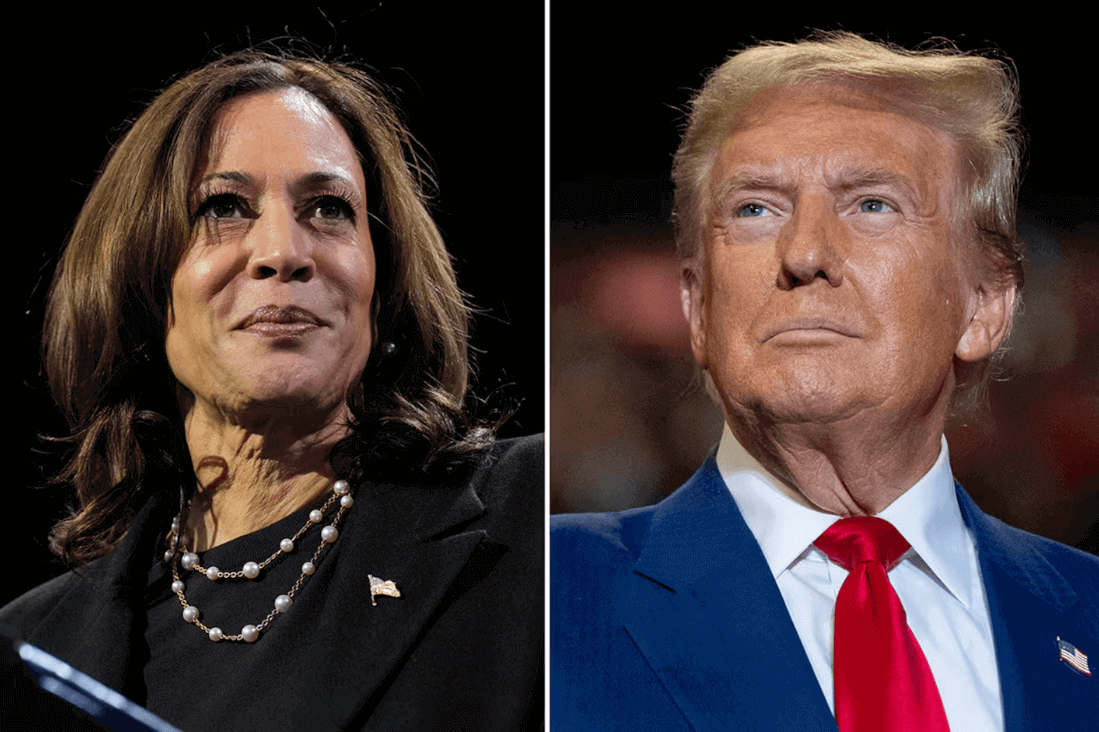特朗普和哈里斯在竞选最后几天的激烈对抗中形成了鲜明的对比

【中美创新时报2024 年 11 月 4 日编译讯】(记者温友平编译)这是总统竞选的最后一个星期日,副总统卡马拉·哈里斯和唐纳德·特朗普继续在战场州奔走寻求支持。但在信息和举止上,民主党人哈里斯和共和党人特朗普截然不同。《纽约时报》记者亚当·纳格尼、凯蒂·格鲁克和迈克尔·戈尔德对此作了下述详细报道。
哈里斯在底特律的一座黑人教堂开始了她的一天,她在那里告诉会众,国家“准备好让历史的弧线朝着正义的方向弯曲”,引用了马丁·路德·金牧师的话。特朗普在宾夕法尼亚州机场的一场户外集会上开始了演讲,他耷拉着肩膀,声音低沉,发表了准备好的讲话,告诉支持者,他在 2020 年输给乔·拜登总统后“不应该离开”白宫。
对决场景形成了鲜明的对比,反映出这两位候选人在竞选最后几天的表现有多么不同,上一轮民意调查显示,双方的竞争仍然和 8 月开始竞选时一样激烈。
特朗普来到宾夕法尼亚州利蒂茨,在宣布放弃准备好的演讲稿以便“真相”大白后,他发表了阴暗、漫无边际、有时甚至愤怒的言论,攻击民意调查,抨击民主党人是“恶魔”,并表示他不会介意记者被枪杀。
“要想打动我,就得有人通过假新闻来报道,但我并不介意,因为我不介意。我不介意,”他说,并提醒大家注意自 7 月在宾夕法尼亚州巴特勒被暗杀以来,户外集会上围绕着他的防弹玻璃屏障。

特朗普辩称,自他担任总统以来,美国一直在衰落,他指出了经济和移民问题,并表示他不应该在 2020 年离开白宫——当时他在败选后努力推翻选举结果。
“在我离开的那天,我们拥有了美国历史上最安全的边境,”他说。 “说实话,我不应该离开,”特朗普继续说道。他补充说,“我们做得很好,我们度过了一段美好的时光——”然后停了下来。
哈里斯的演讲地点是底特律基督大伊曼纽尔教会,她在竞选的最后一个星期天采取了更为传统的竞选路线,唤起了乐观和团结的情绪。“今天能和你们一起做礼拜真是太好了,”在被介绍为“美国下一任总统”后,她说道。
“在接下来的两天里,我们将受到考验,”哈里斯在纽约《周六夜现场》意外亮相后飞往底特律。“这些日子将要求我们付出一切,”她说。“但当我想到未来的日子和我们所侍奉的上帝时,我们就是为这样的时代而生的。”
哈里斯称赞“从所谓的红州到所谓的蓝州的美国人已经准备好将历史的弧线转向正义。”她敦促人们“翻开新的一页,书写我们历史的下一篇章”。
民意调查显示,特朗普一直在从传统上投票给民主党的黑人选民那里争取一些支持。周日公布的《纽约时报》/锡耶纳学院民意调查显示,哈里斯在密歇根州这个重要的战场州与特朗普势均力敌。
在这最后几天和几个小时里,两位候选人都在战场州参加集会和即兴露面。周日上午,特朗普显得特别疲惫;他的声音嘶哑,语速缓慢,发表的讲话中充满了不满,偶尔还有些粗俗。
特朗普在当天的第二站北卡罗来纳州金斯顿相对低调,更严格地按照准备好的讲话稿讲话,偶尔会转移话题,不过有时会咳嗽。有一次,他在台上向宾夕法尼亚州的共和党参议员候选人喊话,然后又纠正了自己,意识到自己在别处。
尽管特朗普的竞选团队周二宣称对自己的胜利充满信心,但他还是利用在宾夕法尼亚州的集会来抱怨民调结果——尤其是《得梅因纪事报》的一项民调显示,他在爱荷华州落后,而人们普遍预计他会赢得这个州。他的竞选团队很快就对其准确性提出质疑。
特朗普延续了过去几周他出席活动的主要主题,将他最广泛的评论集中在选举最后阶段他未经证实的选民欺诈指控上,引发了人们对尚未确定的结果的公正性的质疑。他这样做,加剧了民主党人的担忧,即他和他的支持者试图现在对选举产生怀疑,以便他可以在输掉选举后对结果提出异议——就像他在 2020 年所做的那样。
周日晚上,哈里斯在密歇根州东兰辛的集会上明显更加乐观。“密歇根,还有两天!”她告诉人群。她说,这是“我们一生中最重要的选举之一,我们有动力。它站在我们这边。”
她在东兰辛发表讲话时首先承认了战争对加沙地带造成的破坏,东兰辛是一个阿拉伯裔美国人人口众多的州。这个问题让居住在密歇根州的许多阿拉伯裔美国人和穆斯林选民深有感触,他们中的许多人对拜登政府对以色列的支持感到愤怒。
“考虑到加沙的死亡和破坏规模以及黎巴嫩平民的伤亡和流离失所,今年是艰难的一年,”她说,并补充说,“作为总统,我将尽一切努力结束加沙战争。”
和往常一样,她重申了自己的观点,即战争必须以 2023 年 10 月 7 日哈马斯领导的袭击中被劫持的人质从以色列返回而结束,并以以色列人和巴勒斯坦人安全的方式结束。
周日,哈里斯的竞选团队还发布了最后一个主要广告,这是在 NFL 比赛期间播放的两分钟广告,包括两支摇摆州球队绿湾包装工队和底特律雄狮队之间的对抗赛。
在这个最后一个周末,她的一些最著名的候选人代理人也踏上了征程——尤其是前总统巴拉克·奥巴马。奥巴马在密尔沃基发表讲话时呼吁摇摆不定的选民,特别是黑人和拉丁裔选民,称如果特朗普获胜,他们的处境会更糟。
“如果你是黑人或拉丁裔,并且你觉得除了选举期间,你的社区经常被政客忽视,我理解你的感受,”奥巴马说。“但你为什么会认为答案是投票给一个长期贬低和无视你的社区的人?”
特朗普和哈里斯正在为竞选的最后一天做准备。当然,他们都将在宾夕法尼亚州,这两个竞选团队一直将这里视为 2024 年的成败之州。
本文最初发表于《纽约时报》。
题图:副总统卡马拉·哈里斯和前总统唐纳德·特朗普。美联社
附原英文报道:
A vivid Trump-Harris contrast in campaign’s grueling final days
By Adam Nagourney, Katie Glueck and Michael Gold New York Times,Updated November 3, 2024
Vice President Kamala Harris and former president Donald Trump.ASSOCIATED PRESS
It was the final Sunday of the campaign for president, and Vice President Kamala Harris and Donald Trump were continuing to race across battleground states in their search for support. But in message and demeanor, Harris, the Democrat, and Trump, the Republican, could not have been more different.
Harris began her day at a Black church in Detroit where she told congregants that the nation was “ready to bend the arc of history toward justice,” invoking the words of the Rev. Martin Luther King Jr. Trump began his at an outdoor rally at an airport in Pennsylvania where, his shoulders slumped and his voice subdued, he threw out his prepared remarks to tell supporters that he “shouldn’t have left” the White House after his loss to President Joe Biden in 2020.
The dueling scenes offered a contrast that captured just how differently these two candidates were using the final days of a campaign that a last round of polls suggested remained as tight as it was when their contest began in August.
Trump went to Lititz, Pennsylvania, where, after announcing he was discarding his prepared speech so the “truth” could come out, he proceeded to deliver dark, rambling and at times angry remarks in which he attacked polls, assailed Democrats as “demonic,” and suggested he would not mind if reporters were shot.
“To get to me, somebody would have to shoot through fake news, and I don’t mind that much, ’cause, I don’t mind. I don’t mind,” he said as he called attention to the bulletproof glass barriers that have surrounded him at outdoor rallies since he was shot in July in an assassination attempt in Butler, Pennsylvania.
Trump argued that the country had declined since his presidency, pointing to the economy and immigration, and said he should not have left the White House in 2020 — when he fought to upend the election results after he was defeated.
“We had the safest border in the history of our country the day that I left,” he said. “I shouldn’t have left, I mean, honestly,” Trump continued. He added, “We did so well, we had such a great —” and then cut himself off.
The setting for Harris was the Greater Emmanuel Institutional Church of God in Christ in Detroit, as she took a more conventional campaign route on the last Sunday of the race, invoking notes of optimism and unity. “It’s so good to worship with you today,” she said after being introduced to a swell of cheers as “the next president of the United States.”
“In these next two days, we will be tested,” said Harris, who had flown in to Detroit after a surprise appearance on “Saturday Night Live” in New York. “These days will demand everything we’ve got,” she said. “But when I think about the days ahead and the God we serve, we were born for such a time as this.”
Harris hailed “Americans from so-called red states to so-called blue states who are ready to bend the arc of history toward justice.” And she urged people to “turn the page and write the next chapter of our history.”
Polls have suggested that Trump has been pulling some support from Black voters who traditionally have voted for Democrats. A New York Times/Siena College poll released Sunday showed Harris in a tight race with Trump in Michigan, an important battleground state.
In these final days and hours, both candidates have been racing through rallies and impromptu appearances in the battleground states. Trump appeared particularly tired on Sunday morning; his voice was hoarse and his pace was slow as he delivered remarks marked by grievances and the occasional vulgarity.
Trump was relatively subdued at his second stop of the day, in Kinston, North Carolina, sticking more closely to the script of his prepared remarks, with occasional diversions, though coughing at times. At one point, he called out to Pennsylvania’s Republican Senate candidate from the stage, then corrected himself, realizing he was elsewhere.
Even as his campaign professed confidence of his victory on Tuesday, Trump used his rally in Pennsylvania to complain about polls — in particular one in the Des Moines Register showing him behind in Iowa, a state he was widely expected to win. His campaign was quick to dispute its accuracy.
And Trump, continuing what has been a dominant theme of his appearances these past few weeks, devoted his most expansive comments to his unsupported claims of voter fraud in the final stretch of the election, raising questions about the integrity of a result that has yet to be determined. In so doing, he reinforced Democratic fears that he and his supporters are trying to sow doubts about the election now so he can dispute the outcome — as he did in 2020 — should he lose.
Harris was markedly more upbeat at a rally Sunday evening in East Lansing, Michigan. “Michigan, two days to go!” she told the crowd. This, she said, is “one of the most consequential elections of our lifetime, and we have momentum. It is on our side.”
She opened her remarks in East Lansing, in a state with a significant population of Arab Americans, by acknowledging the devastation of the war in the Gaza Strip. That is an issue that hits home for the many Arab American and Muslim voters who live in Michigan, many of whom are angry about the Biden administration’s support for Israel.
“This year has been difficult given the scale of death and destruction in Gaza and given the civilian casualties and displacement in Lebanon,” she said, adding that “as president, I will do everything in my power to end the war in Gaza.”
As she often does, she reiterated her view that the war must end with the return of those taken hostage from Israel during the Hamas-led attack on Oct. 7, 2023, and in a way that Israelis and Palestinians are secure.
On Sunday, Harris’ campaign has also released its final major ad, a two-minute spot running during NFL games, including the rivalry matchup between the Green Bay Packers and Detroit Lions, two swing-state teams.
On this final weekend, some of her most prominent candidate surrogates went on the road as well — notably former President Barack Obama. Speaking in Milwaukee, Obama appealed to voters on the fence, particularly Black and Latino voters, arguing they would be worse off should Trump win.
“If you’re Black or Latino and you feel like too often your community is overlooked by politicians except around election time, I get how you feel,” Obama said. “But why would you think that the answer is to vote for someone who has a long history of demeaning and disregarding your communities?”
Trump and Harris are preparing for the final day of the campaign. And they will, of course, both be in Pennsylvania, the place that both campaigns have always viewed as the make-or-break state of 2024.
This article originally appeared in The New York Times.

